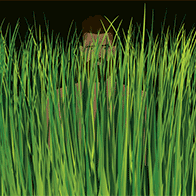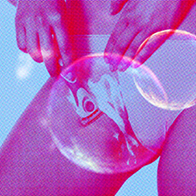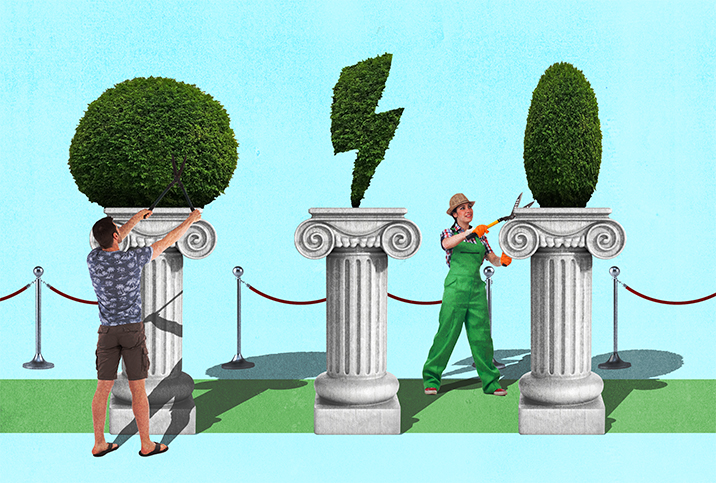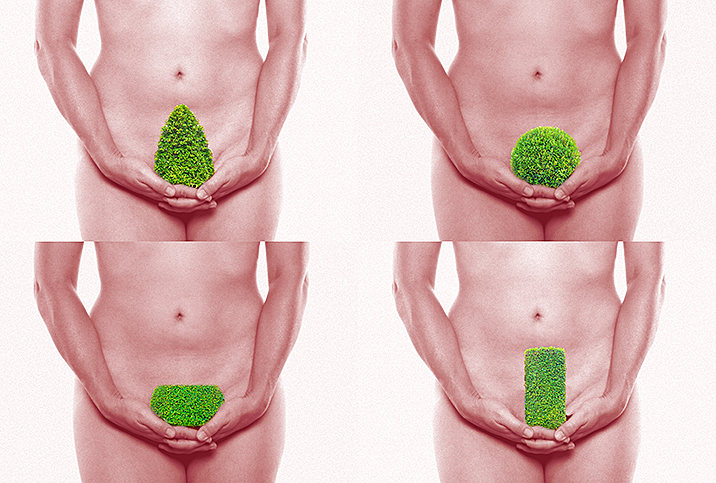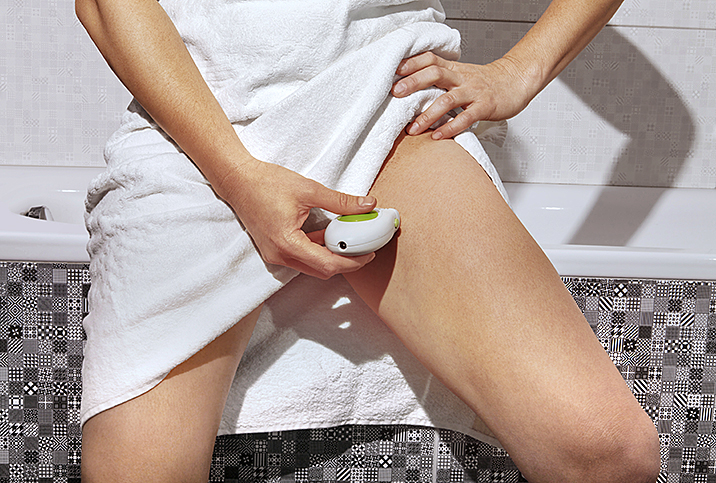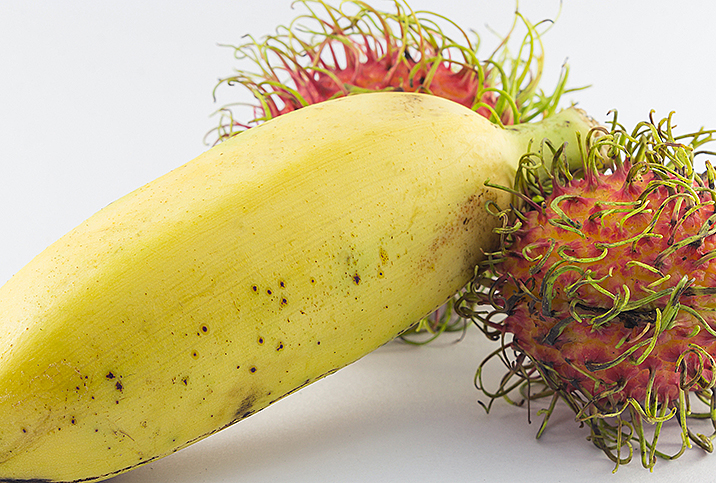Doctors Weigh In on the Health Benefits of Pubic Hair

From a wild and woolly full-on bush to a bare Brazilian wax, pubic hairstyles run the gamut. And everyone's got a preference. But did you know your pubic grooming habits might actually impact your health?
We talked to four experts to get the lowdown on your down-low.
Pubic hair = protection?
"From an evolutionary perspective, [pubic hair] may have provided protection. Before people wore underwear, pubic hair may have kept dirt and other contaminants away from the genitals," said Sara Twogood, M.D., a board-certified OB-GYN in Los Angeles and co-founder of Female Health Education and the online magazine Female Health Collective.
Pubic hair might not be quite as essential as it was when the world was a giant nudist colony. But it's still useful and possibly healthy.
"Pubic hair exists for a purpose—it's not unhealthy to have hair there," said Kate White, M.D., M.P.H., an OB-GYN, associate professor and author of "Your Guide to Miscarriage & Pregnancy Loss."
'In the same way that, for example, eyelashes can protect the eyes from debris and infection, pubic hair can serve the same purpose.'
"It's true that you may have a slightly stronger body odor if you leave your pubic hair untamed, as the hair traps sweat, oil and bacteria," White continued. "But if you wash regularly, this odor just signifies that your pubic hair is doing its job of protecting you."
Laura Purdy, M.D., a family medicine doctor in Nashville and medical director at wisp, a healthcare site, agreed that pubic hair can have protective properties.
"In the same way that, for example, eyelashes can protect the eyes from debris and infection, pubic hair can serve the same purpose," she said.
Sebum, an odorless secretion produced in the sebaceous glands in the mons (the area overlying the pubic bone, where hair grows), can also prohibit harmful bacteria from growing and multiplying, Purdy and White said. This might provide some protection from infections, including cellulitis, urinary tract infections (UTIs), vaginitis and yeast infections.
Sexual benefits of pubic hair
Although some folks feel self-conscious about the slight odor of untamed pubic hair, it might be a boon in the bedroom. When the sebum produced in the mons mixes with bacteria in the skin and hair, it produces pheromones—aromatic chemicals designed to trigger a social response in the recipient. In this case, the target is your partner, and the aim is arousal. Because pubic hair retains pheromones, the fuller the bush, the stronger the scent.
Hair down there also keeps things cozy and comfortable during sex.
"We know that pubic hair helps prevent friction of the delicate genital skin during intercourse," White said. "If you don't remove all your pubic hair, it may help keep your nether region warm, which may help you stay aroused when you're with a partner."
The health benefits and risks associated with pubic hair
Some evidence suggests pubic hair might protect against sexually transmitted infections (STIs), as well. In a 2016 study published in the British Medical Journal (BMJ), researchers surveyed more than 7,500 participants. They concluded any type of pubic grooming correlated with a higher risk of STIs, including herpes, HPV, chlamydia and gonorrhea.
However, not all experts agree, and more research is needed.
"There is little data about this. STIs are spread through direct contact with skin or mucous membranes [like the vagina]," Twogood explained. "Pubic hair doesn't stop either of these. The one STI that could be decreased with pubic hair removal is pubic lice [crabs]."
"There's no clear association between pubic hair removal and risk of STIs or vaginal infections," White agreed. "Some studies have found that people who groom all their pubic hair are at higher risk of STIs, but other studies have not seen this same relationship.
"But we do know that when hair removal leads to injuries—such as follicle infections, burns or rashes—those breaks in the skin make you more vulnerable to infection," she added.
Fortunately, infections of the mons won't necessarily affect your vagina.
"The vagina is a different type of tissue [than the mons]. It's a mucous membrane," Purdy said. "So, while pubic hair can in and of itself serve a protective function, there's not really any correlation between outbreaks on the skin of the pubic area and the health of the inside of the vagina. That's kind of like saying, 'Does acne on the face cause any problems inside of the mouth?' They're really two separate areas. And ingrown hairs or infected hair follicles does not affect the overall health of a vagina."
Still, these types of infections aren't always innocuous.
"Sometimes these infections can get serious and lead to boils or abscesses that might require a procedure by a doctor to drain," White said.
Amy Roskin, an OB-GYN and chief medical officer at The Pill Club, cited a 2017 study indicating a 25.6 percent injury rate from pubic hair grooming.
"Most of these injuries were fortunately minor, but 1.4 percent required medical attention," she said.
In the study, researchers found waxing was the hair removal method least likely to cause injury for people with vaginas. Unsurprisingly, the barer people went and the more frequently they groomed, the more likely they were to be injured.
Grooming 101
If you do prefer a low pile carpet over shag, what's the best way to go about grooming?
"It's different for different people and depends on the person's preference, anatomy, ease of doing the removal, skin sensitivity, etc.," Twogood said. "I usually tell my patients that it's not necessary to remove pubic hair. But if they decide to and are using a service [such as waxing or laser], get some references from friends.
"When done properly, most types of pubic hair removal are safe and effective," Twogood added. "But they do have risks."
Besides ensuring your wax or laser technician is legitimate (an important step), there are a few other ways to decrease your risk of injury. One is to trim rather than going bare, especially if you're going the DIY route. And whatever you do, keep your tools clean and skin moist.
White recommended the following tips for hair removal:
- Trimming: "Disinfect your scissors before you use them and don't use them to trim other things."
- Shaving: "Keep your skin wet [using soap or shaving cream/gel is best] and shave in the direction of the hair growth. Change your blades regularly—it doesn't seem like it, but you're more likely to cut your skin with an old blade, which has developed nicks that you can't see."
- At-home waxing: Use a mirror. A mirror is helpful for cold waxing at home to avoid catching extra skin, like the labia minora, under the strips.
- Salon waxing: Ensure the technician uses a fresh pot of wax.
"For all methods, moisturize your skin afterward to soothe irritation," White concluded.
If you experience irritation or razor burn, applying aloe vera gel or coconut oil or taking an oatmeal bath may ease discomfort and redness.







